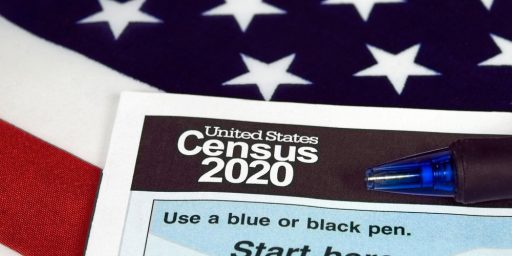Are We Turning The Corner?
Or is the corner in sight? James Hamilton lists some indications that the answer to the latter question might be a tentative yes.
A couple of weeks ago we received the encouraging news that retail sales for both January and February were 1.8% above December. On Monday the National Association of Realtors reported that February sales of existing homes were 5.1% above January levels on a seasonally adjusted basis. Today the Census Bureau reported that new orders for manufactured durable goods rose 3.4% in February, with new orders for nondefense capital goods up 7.4%. And also today the Census Bureau reported that new home sales in February were up 4.7% (on a seasonally adjusted basis) relative to January. Is the tide starting to turn?
Overall, with some reason for caution, Prof. Hamilton takes some encouragement from this news.
Tyler Cowen, not so much,
The rosy scenario is that in a highly connected, internet-intensive world, the bad news travels far more quickly and far more convincingly than before. The early stages of the downturn are like falling off a cliff. We bottomed out maybe two weeks ago. That said, the rebound also comes much more quickly. Wages are more flexible than before. Bad inventory policies are avoided through information technology. The Fed responds to changing conditions ever more quickly. Overall, economic time accelerates on both the downswing and the upswing.
I do not believe the rosy scenario, as I think there are still other “shoes to drop,” most of all internationally. I also think we will see a double-dip or triple-dip recession, as the Fed must eventually withdraw some of new money from the system. Good news is then, in fact, simply a sign that some bad news is on the way, sooner or later.
Regarding the “double/triple dip recession” that has happened before. Back in the late 1930’s the economy slipped back into recession as it was climbing out of the Great Depression. Then again in the early 1980s there were two recessions that were very close toether. One could argue a triple dip is highly unlikely, but I’d be reluctant to rule it out.



I’m not a business cycle scholar but I can’t help but wonder whether double or triple dip recessions are artifacts. Does anybody have any knowledge of this subject? There doesn’t seem to be much serious info floating about.
I know what you mean, is it really a double dip or did the previous recession simply not end.
I have no idea, but it is nice that the sentiment is making its way out there.
The 1937-38 recession was not a double dip recession. The 1933-37 expansion was 50 months long, the longest on record at that time. Moreover, real gdp growth averaged some 10% in that expansion
and real gdp surpassed the 1929 peak in 1936.
But both the 1937-38 and the 1981-82 recessions were the result of a deliberate Fed tightening to fight inflation.
I think this is the point Cowen is making. Eventually the Fed is going to want to slow down and even stop what it is doing. Such an action could percipitate another recession. Whether we call it a double dip or whatever is more semantics than anything else. Even after things turn around, we could find that our cure…really wasn’t a cure.
Steve, there you go taking a long term view again. Not a single poll supports such fanatical theorizing.
Prosperity had better be “just around the corner”
Or else we will find ourselves perpetually making only left turns around the new “Communist block”.
Neo-Coms??hehehe